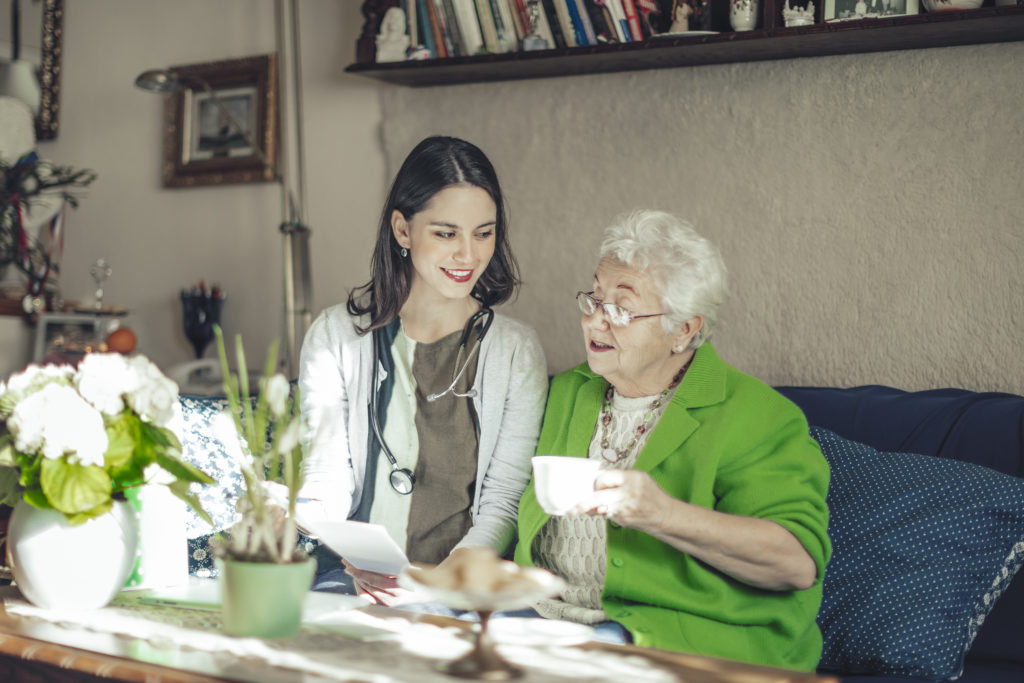
In Olive Branch and elsewhere this September, people all around the globe will be observing World Alzheimer’s Month to call attention to this deadly disease. Alzheimer’s is the most common form of dementia, and it impacts around 6% of those individuals over the age of 65 in the United States. It is characterized by a gradual, progressive loss of cognitive faculties, generally resulting in an invalid status for the victim. In the later stages of the disease, almost constant care is necessary for the afflicted person. As yet, there is no known cure for the disease, so a great deal of research is still ongoing with the hope of finding a cure. For the most part, senior home care for an Alzheimer’s patient consists of helping the patient do all those activities that the disease has made difficult or impossible. In this article, we’ll discuss some of the precautions you should be taking when caring for your senior loved one if they have Alzheimer’s.
Home Safety
Home safety becomes very important when at least one member of the household is troubled by Alzheimer’s disease. If there are staircases within the home, there should be at least one handrail in place to help a senior navigate the stairs safely. Unused electrical outlets should be plugged so that electrical accidents can’t happen. Hazards around the house, including small rugs, should be removed so they don’t present an obstacle that could trigger an accident. Any area of the home where your senior might visit should be well-lit, so there’s no problem with seeing everything. Household cleaning products should be safely locked away in a storage area or cupboard so they can’t be accessed. Taking some precautions like this will help to avoid any nasty occurrences that might take place.
Wandering
People afflicted with Alzheimer’s have a tendency to wander because the disease causes them to lose familiarity with faces and places. Alzheimer’s generates confusion in the mind of a person and throws off their normal sense of direction. There are numerous strategies that can be used to limit the amount of wandering your loved one might engage in. One good idea is to engage them in meaningful activities whenever possible, so as to reduce the opportunity for wandering. You should avoid going to really busy areas that could intensify the disorientation felt by a patient. Car keys should be kept secure somewhere that the patient cannot access, so they aren’t tempted to take a spontaneous drive somewhere. If you observe your loved one acting disoriented, do your best to comfort and reassure them until the feeling passes.
Taking Medications
It’s fairly obvious that there is considerable inherent danger involved if a senior bothered by Alzheimer’s is allowed to take their own medications. In the beginning stages of the disease, this may not be such a big issue, but as the disease progresses, the danger increases. If a senior becomes confused about which medication to take, how often, or what time of day – the consequences can be serious. For that reason, it’s best to supervise the taking of all medications for safety’s sake. For greater safety, you should learn about all the effects of each medication taken by your loved one, including any side effects. You should also educate yourself about the potential effects of the interaction of drugs, especially if the wrong dosage should be taken.
Abuse
People bothered by Alzheimer’s can be easy targets for abuse. This makes it important to recognize the signs and symptoms of abuse, because your loved one may not be able to express what has happened to them. Look for any unexplained bruises around the body, and be alert to sudden changes in behavior. Some of these may include an abrupt withdrawal from activities, a change in their alertness, or the sudden onset of depression. If your loved one resides in some kind of assisted living facility, be on the lookout for any signs of neglect or abuse. If anyone else in your family is providing care for your loved one, be alert to the possibility of that same kind of neglect or abuse.
Emergency Precautions
There are all kinds of emergencies that could happen, so it would be literally impossible to have a backup plan that covers them all. However, it is a good idea to plan for predictable emergencies like weather events. If your geographic area should be hit by a tornado, hurricane, flood, volcanic eruption, wildfire, or any other kind of emergency like this, it will create a great deal of confusion. The last thing you want is for an already confused person to become even more disoriented by the events attending a natural disaster or extreme weather event. Have plans for how to react to such events, and make sure to include caring for your senior loved one. This could make all the difference between a relatively harmless emergency, and one that triggers a disaster in your household.
